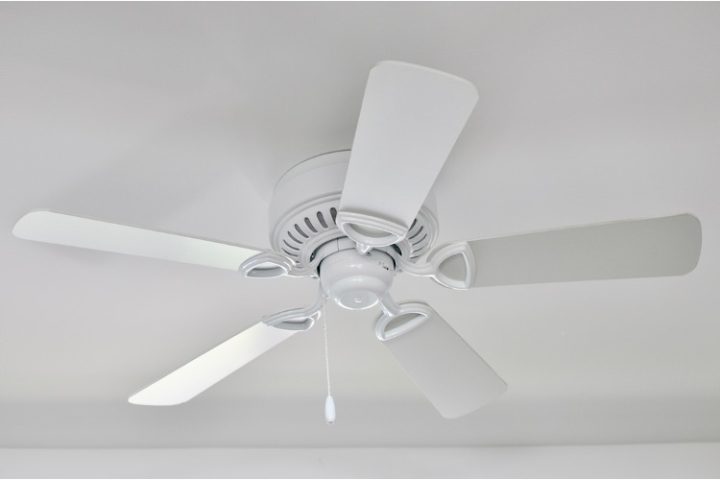
“Of all tyrannies, a tyranny sincerely exercised for the good of its victims may be the most oppressive,” wrote philosopher C.S. Lewis. “It would be better to live under robber barons than under omnipotent moral busybodies. The robber baron’s cruelty may sometimes sleep, his cupidity may at some point be satiated; but those who torment us for our own good will torment us without end for they do so with the approval of their own conscience.”
Whether or not our nanny-state busybodies exercise their tyranny “sincerely,” the above passage could come to mind when pondering the Joe Biden administration’s latest greentopian target: ceiling fans.
That’s right, trying to force people to drive unfeasible electric cars, use paper straws containing possibly toxic chemicals, embrace inferior dishwashers and washing machines, and become teetotalers isn’t enough. As Fox News reports:
The Department of Energy [DoE] is proposing a rule that would require ceiling fans to be more energy efficient, arguing the move would save U.S. households on energy costs.
According to the Energy Department’s analysis, the new rules would save households about $39 over the lifespan of the new energy-efficient fan. However, the cost to manufacturers associated with the increased equipment will total $86.6 million per year, the department said.
Republicans on the House Committee on Small Business say if the rule goes into effect it could put small manufacturers out of business, given the costs the companies would incur in order to comply with the changes.
“This rule would require numerous small business fan manufacturers to redesign their products and may put between 10 and 30 percent of small business ceiling fan manufacturers out of business,” the GOP members of the committee wrote in a letter to Energy Secretary Jennifer Granholm on Thursday. “It appears that the Department of Energy (DOE) may not have properly considered small entities during this rulemaking process.”
As mentioned earlier, however, this is just par for the course. In fact, the “Energy Department has recently been imposing and proposing new, stringent regulations on various household appliances, including for washing machines, gas stoves, refrigerators, air conditioners and dishwashers,” Just the News reminds us.
Now, it first should be noted that the DoE is one of the federal government’s many unconstitutional agencies/endeavors (late economics professor Walter E. Williams calculated years ago that approximately two-thirds of the feds’ budget involved matters lacking constitutional warrant). Also realize that just as how “civil rights” groups such as the Southern Poverty Law Center justify their continued existence by ever creatively “finding” new “white supremacists,” bureaucracies do so by creatively finding new “evils” to regulate. This is yet another reason government busybodies “will torment us without end.”
Worse still, their prescriptions too often do more harm than good. Just consider, for example, the DoE’s proposal to limit new dishwashers — which are already restricted to five gallons per cycle (GPC) and must use 3.5 GPC or less to get an Energy Star rating — to 3.2 GPC. This may sound good, of course, but the devil is in the details.
Thinking that limiting an appliance’s water usage guarantees water-use reduction ignores that these situations aren’t static but, no pun intended, fluid: A regulation may have secondary effects that cause people to alter their behavior.
As Senator John Kennedy (R-La.) pointed out in June regarding dishwashers, for instance, if reducing per-cycle water usage causes inferior cleaning outcomes, people may run the dishwasher again and use close to twice as much water as before. What’s more, some people may at times resort to hand washing dishes, which can use up to 27 gallons per “load.”
In other words, even if people just rewash some dishes by hand to do the job the regulation-handicapped washer didn’t do, the mandate will lead to more water usage.
This secondary-effect phenomenon is seen continually, mind you. As an example, a building superintendent in my neighborhood told me that he stopped installing low-flow toilet flushometers because they weren’t actually saving water — as people had to flush twice to be rid of all the statist matter in the bowl.
And what, anyway, is the ideal dishwasher water usage? Five gallons? Three and a half? Three? How have the bureaucrats and politicians divined that 3.2 is the magic number?
The reality is, they have no idea. Most people have expertise in only a narrow range of endeavor, and politicians are narrower still, knowing little beyond how to demagogue their way into power.
This brings us back to ceiling fans. I’ve nothing to say about how new regulations would affect them because, having at least some humility, I accept that I know as little about them as the politicians do. Here’s what we all can know, though:
Just as how someone close to me replaced his old washing machine some years back because it used too much water (and in that way he applied market pressure), consumer decisions in concert with manufacturer profit motives will likely ensure the production of effective, efficient ceiling fans — that is, if the government stays out of their way.
Oh, one more thing bears mentioning. Another problem with federal regulation is that it’s a one-size-fits-all approach inappropriate for a vast country with great environmental diversity. Water standards are a good example: While drought is a problem in arid Arizona, Tennessee is overflowing with water and has to worry more about floods.
None of this means, however, that regulations prescribing limits are unnecessary. A law placing a low cap on the number of federal bureaucrats would be most welcome.



